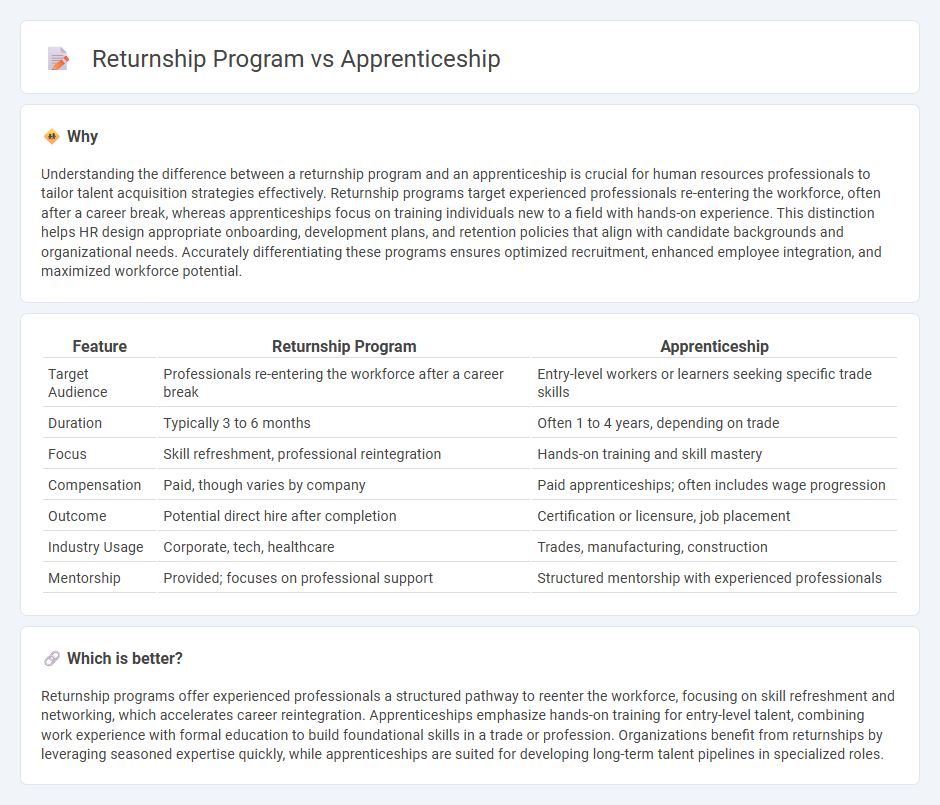
Returnship programs offer experienced professionals a structured pathway to re-enter the workforce after a career break, emphasizing skill refreshment and practical work exposure. Apprenticeships focus on hands-on training for individuals new to a field, combining mentorship with paid work to develop specialized skills. Discover how these programs can bridge talent gaps and enhance workforce diversity.
Why it is important
Understanding the difference between a returnship program and an apprenticeship is crucial for human resources professionals to tailor talent acquisition strategies effectively. Returnship programs target experienced professionals re-entering the workforce, often after a career break, whereas apprenticeships focus on training individuals new to a field with hands-on experience. This distinction helps HR design appropriate onboarding, development plans, and retention policies that align with candidate backgrounds and organizational needs. Accurately differentiating these programs ensures optimized recruitment, enhanced employee integration, and maximized workforce potential.
Comparison Table
| Feature | Returnship Program | Apprenticeship |
|---|---|---|
| Target Audience | Professionals re-entering the workforce after a career break | Entry-level workers or learners seeking specific trade skills |
| Duration | Typically 3 to 6 months | Often 1 to 4 years, depending on trade |
| Focus | Skill refreshment, professional reintegration | Hands-on training and skill mastery |
| Compensation | Paid, though varies by company | Paid apprenticeships; often includes wage progression |
| Outcome | Potential direct hire after completion | Certification or licensure, job placement |
| Industry Usage | Corporate, tech, healthcare | Trades, manufacturing, construction |
| Mentorship | Provided; focuses on professional support | Structured mentorship with experienced professionals |
Which is better?
Returnship programs offer experienced professionals a structured pathway to reenter the workforce, focusing on skill refreshment and networking, which accelerates career reintegration. Apprenticeships emphasize hands-on training for entry-level talent, combining work experience with formal education to build foundational skills in a trade or profession. Organizations benefit from returnships by leveraging seasoned expertise quickly, while apprenticeships are suited for developing long-term talent pipelines in specialized roles.
Connection
Returnship programs and apprenticeships both serve as structured pathways for workforce reentry and skill development, targeting individuals seeking to update or acquire new competencies. Returnships typically support professionals rejoining the workforce after a career break, offering mentorship and real-world experience, while apprenticeships provide hands-on training combined with classroom instruction for skill acquisition. Both models enhance talent pipelines, improve employee retention, and address skills gaps within Human Resources strategies.
Key Terms
On-the-job Training
Apprenticeship programs provide structured on-the-job training combined with classroom instruction, enabling participants to gain industry-specific skills over an extended period. Returnship programs, designed for professionals re-entering the workforce after a career break, offer targeted, often shorter-term practical training to update skills and ease transition back into employment. Explore detailed comparisons to determine which training model best suits your career development needs.
Career Transition
Apprenticeship programs provide structured, hands-on training to develop skills for entry into a new career, often targeting individuals with limited experience. Returnship programs are designed specifically for professionals re-entering the workforce after an extended break, offering tailored support and bridging opportunities. Explore how these programs can facilitate your successful career transition.
Workforce Integration
Apprenticeship programs provide structured, hands-on training designed to integrate new workers into industries with skill development and mentorship, commonly in trades and technology sectors. Returnship programs target experienced professionals re-entering the workforce after a career break, offering tailored support to update skills and rebuild professional networks. Explore how these programs uniquely support workforce integration and career advancement.
Source and External Links
APPRENTICESHIP - An apprenticeship combines on-the-job training with classroom learning, offering a paid job while developing skills in a highly skilled career.
Apprenticeship Utah - Apprenticeship Utah provides an "earn and learn" model that combines on-the-job learning with related classroom instruction for various industries.
Apprenticeship.gov: Homepage - Apprenticeship.gov connects career seekers, employers, and educators with apprenticeship resources across different industries.
 dowidth.com
dowidth.com